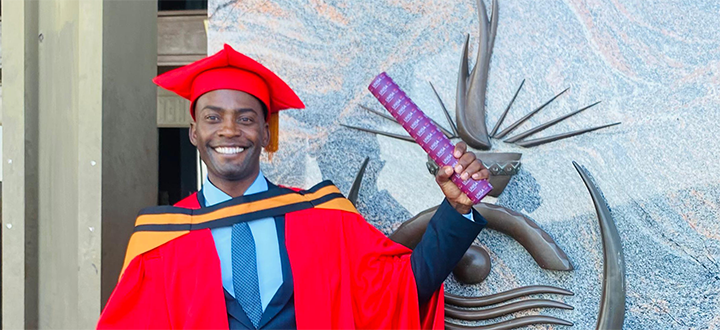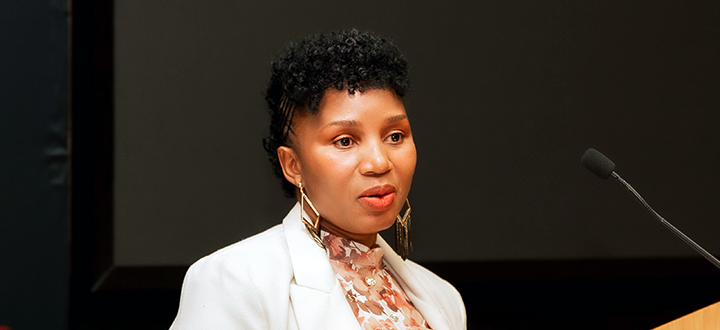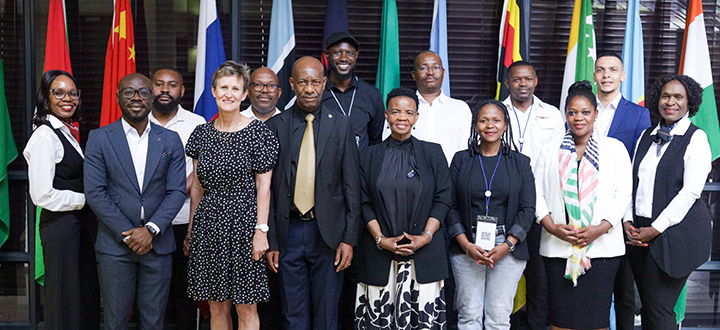College of Human Sciences
Unisan’s doctorate inspires his community

Dr Sydney Maluleke
Hailing from a rural village called Muyexe situated in Giyani, Limpopo Province, Dr Sydney Maluleka, a lecturer in the Department of English Studies, is an excellent example of not allowing where you come from to determine your future. He used his humble origins in a rural area as motivation to achieve his goal of obtaining a doctorate in English Studies.
"As a young boy growing up in a deep rural village, I witnessed how a lack of education hindered many people from participating in the mainstream economy," says Maluleka. "Pursuing my education up to doctoral level is another way of saying to a young person in the dusty streets of Muyexe Village that it’s possible, no matter where you come from."
His study, entitled "Creating space(s) for voice in English academic writing through memoir writing: A case study of first year students at an ODL university in South Africa", examines how memoir writing can be used to enhance first-year students’ development of an academic writing voice. Data was collected for this qualitative case study through in-depth interviews, documents and observations, which were analysed thematically. The study reveals that memoir writing can serve as a baseline for developing students’ sense of voice, which they can transfer into their academic writing. In addition, the study's findings show that memoir writing can serve therapeutic goals and help build self-confidence
Maluleke recently obtained his PhD in Languages, Linguistics and Literature. His research was inspired by his experiences as an undergraduate student who struggled with academic writing, particularly the expression of his own voice. Maluleka says the study has helped him reflect and interrogate his own experiences and try to understand the deeper factors that impacted his transition from high school to university.
"Through this study," he says, "I realised that my experiences were just a microcosm of the challenges that many students from previously disadvantaged backgrounds encounter daily. Such experiences hinder their access to knowledge and their attempt to negotiate their position within disciplinary discourse. This study helped bring forth different pedagogic approaches that can help enhance students’ development of academic writing proficiency."
Maluleke hopes that his study will assist universities in reviewing their modules with a special focus on teaching and developing students’ academic writing proficiency. Additionally, the study is also applicable at secondary school level. It can inform those who teach writing about the specific skills they need to focus more on in preparing learners to transition to university.
When asked about his future plans, he responded that this important milestone marks the continuation of his journey as a scholar. He intends to expand his research by working in proximity with schools and communities through engaged scholarships, where he will assist in addressing issues of illiteracy.
Maluleke says his accomplishment of a doctorate is a win for his family, who have been very supportive all these years. "I am also very humbled by the dedication shown by my supervisors, Professor MMK Lephalala and Professor DC Byrne, throughout the years since I registered for this study," he says. "I dedicate this degree to my children, Tsatsawani and Omphile."
Dr Thuli Shandu, Chair of the Department of English, applauded Maluleke for his dedication during his PhD journey. "On behalf of the Department of English Studies, we congratulate Dr Maluleka," she says. "May this great achievement be a stepping stone to more achievements and a beacon of light to the people of his community."
* By Nnana Martina Jege, Communications and Marketing, College of Human Sciences
Publish date: 2025-06-26 00:00:00.0


 Wings of opportunity: Bringing drones into the classroom
Wings of opportunity: Bringing drones into the classroom
 Visionary youth champion to address Unisa’s Innovation Festival
Visionary youth champion to address Unisa’s Innovation Festival
 Finding the strength to persevere
Finding the strength to persevere
 Disability awareness at Unisa: Disability is not inability
Disability awareness at Unisa: Disability is not inability
 Unisa symposium shares knowledge on building SA's aviation economy
Unisa symposium shares knowledge on building SA's aviation economy